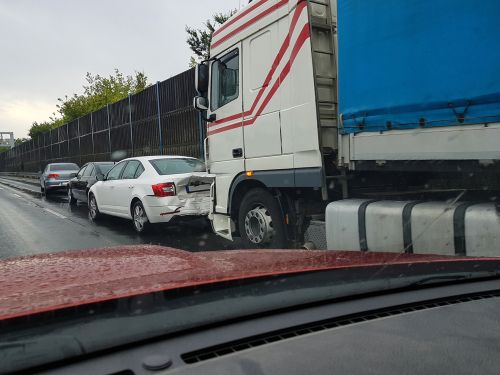To increase profit margins, some businesses get tempted to cut corners, and most times, this can mean engaging in potentially dangerous schemes. One way they do this is by increasing the payload of their vehicles while also reducing transportation costs, as in the case of an overloaded truck.
Some businesses also go as far as modifying their vehicles to handle higher payloads, such as increasing the tire width and adding anti-swing kits. Not only is this activity shortsighted; it can also be particularly dangerous.
Even without knowing about these malpractices in the industry, people instinctively avoid getting too close to large trucks. It doesn’t matter if they are drivers sharing the same road or pedestrians who are aware of the risks of walking too close to these vehicles.
The numbers don’t lie
The U.S. Department of Transportation’s Fatality Analysis Reporting System (FARS) shares the following latest statistics (2017) available from the website:
- 4,102 people died in large truck crashes
- 11 percent of fatalities in motor vehicle crashes involved large trucks
- 17 percent of fatalities in motor vehicle crashes involving large trucks were truck occupants
- 68 percent of fatalities in motor vehicle crashes involving large trucks were occupants of cars and other passenger vehicles
- 14 percent of fatalities in motor vehicle crashes involving large trucks were either pedestrians, bicyclists or motorcyclists
- 97 percent of fatalities in two-vehicle crashes that involved a passenger vehicle and a large truck were occupants of the passenger vehicles
- 60 percent of fatalities involving large truck occupants in multiple-vehicle collisions happened in crashes involving another large truck
- 22 percent of passenger vehicle occupant fatalities in multiple-vehicle crashes involved large trucks
- 12 percent of all passenger vehicle occupant fatalities in multiple-vehicle crashes resulted from large truck collisions
These large trucks include 18-wheelers, coal trucks, dump trucks, buses, cement or concrete mixer trucks, and similar vehicles.

Load-related truck accidents
Many factors can lead to truck collisions or accidents, including a driver who’s exhausted or distracted, bad weather, poorly-maintained equipment, or malfunctioning components. However, there’s another factor that’s usually overlooked: the cargo.
Overloaded trucks
Several problems may occur if the freight is not packed correctly onto the vehicle. The first is overloading, which takes place when the truck is so heavy that it exceeds the weight limits set by the Federal Motor Carrier Safety Administration (FMCSA).
The permissible weight varies depending on the truck. It then falls on the truck drivers and cargo loaders to pay close attention to the identification plate of the truck. This plat should contain information regarding the total allowable axle weight and the highest permissible gross vehicle weight.
If a truck is filled with freight, due to the extra weight, it may end up having mechanical problems. Such mechanical failures can result in a loss of vehicle control by the driver, leading to a disastrous accident. And even if the weight does not result in total mechanical failure, the additional weight could still make it difficult for the driver to stop the truck properly.
Moreover, a truck with a load that exceeds the maximum weight limit could be difficult to control when the driver has to navigate a slope. Gravity could force the truck forward, causing it to collide with another vehicle or some other structure on the street.
The risks that overloaded freight can pose are well-known to trucking companies, container shippers, and drivers. But this knowledge, unfortunately, doesn’t keep some of them from overloading trucks to be able to reach tight deadlines or strict quotas and boost profits by increasing delivery capacity per truck.
Uneven cargo distribution
Those tasked to load freight onto a truck must be careful about how much cargo is packed and also on how it is loaded. If the cargo is not properly loaded onto the truck, it may still cause problems even if it is within the permissible weight range.
The freight must be packed equally on both sides of the container. When one side is lighter than the other, it could be dangerous to make simple movements like changing lanes and turning. The unequally distributed weight can cause the entire truck to turn on its side, thereby posing serious danger to the truck driver and other drivers.
Improperly secured cargo
Cargo that is loaded correctly and is within the appropriate weight range, but is not secured properly, can still cause accidents. At some point during the ride, the freight might potentially flip or slide, causing loud noises that might annoy or startle the driver and cause him to run into another lane.
If the cargo continues to move around, it could also impact the weight distribution. If too much of it drops to one side, the next time the driver turns or switches directions, the truck could accidentally tip over.
Naturally, unsecured cargo could still result in injuries or deaths if it starts to fall or fly off the truck. There may be no time for other drivers to move away from the truck to stop the flying cargo from landing on them or their path. Even though the freight may not hit a truck, it could still be risky if it falls in the middle of a highway, thereby creating a road hazard.
Drivers of fully loaded trucks attempting to make swift turns also pose a high accident risk, especially if there is uneven weight distribution. Sudden or swift turns can cause imbalances in cargo distribution, so there is a risk of the vehicle tipping over.
Weight and its impact on vehicle stopping distance
As we already know, vehicle load has an impact on truck crashes. This means that weight and stopping distance are inextricably linked.
The typical motor vehicle weighs approximately 2.5 tons, while a tractor-trailer can weigh 40 tons. Because of the heavy weight of the latter, it takes a tractor-trailer significantly longer (and at a longer distance) to get to a full stop.
To illustrate this, imagine a typical motor vehicle (car) traveling at a speed of 40 miles per hour and a tractor-trailer running at the same speed. To stop, the big truck will have to go another 45 feet further before it can get to a complete stop.
Of course, speed is a huge factor when it comes to braking. Upon hitting the brakes, the quicker a vehicle is going, the longer it would take to stop. Large truck deaths and injuries resulting from collisions and crashes are quite severe for these reasons (size and weight of large trucks).

Other causes of truck accidents
Aside from truck accidents that are directly related to cargo load, there are other causes of truck accidents.
Stress
Truck drivers are usually bound to meet customer-specific delivery times. Even if they are driving long distances or getting stuck or have to drive through varying road and traffic conditions, they are expected to deliver anyway. This could lead them to lose sleep (physical stress), and get mentally stressed to fulfill business obligations.
According to the Truck Crash Causation Study, a 33-month-long survey conducted by the Federal Motor Carrier Safety Administration (FMCSA) and National Highway Traffic Safety Administration (NHTSA), driver fatigue, and illness were a major cause of commercial truck and passenger vehicle collisions.
Speeding
As already mentioned, driving speed can worsen what damage can happen in large truck accidents. Whether driving a motorcycle, car, or any type of vehicle, speeding is a precursor for collisions. The resulting extent of damage, though, is usually much worse when it involves a truck.
Speeding truck-related collisions are exacerbated by several factors, including the inability to brake sufficiently, weather conditions that affect road visibility, curves (where vehicles are supposed to slow down), blind spots, improper loading or unsecured loads, loss of control, and hydroplaning.
Truck drivers who are in a hurry to get to their destination and meet quotas or deadlines usually lose focus on other driving factors for road safety. Of course, speeding and weaving in and out of traffic, combined with a heavy truckload, increase the risk for accidents happening in this scenario.
Distraction or inattention
Inattentive or distracted drivers (not just truck drivers) pose a real danger to others on the road. Sources of distraction can include any of the following:
- Texting, posting, or talking on the phone while driving
- Zoning out
- Adjusting or looking at the GPS, music, or vehicle controls
- Conversing with passengers
- Any activity that requires a driver to take their eyes off the road momentarily
Not yielding right away
Obstinately operating on the road as if they always have the right of way has landed many truck drivers in trouble. Worse still, drivers who refuse to obey or observe basic road courtesy put their lives and the lives of others in grave danger.
Failure to yield the right of way when it is clearly the right (and safe) thing to do under the circumstances can lead to liability for any accidents that result from such unreasonable road behavior.
Impairment
Drivers who drive under the influence of an illegal substance, and after taking prescribed drugs that are known to cause sleepiness, drowsiness, dizziness, or inattention can be held liable for accidents arising for their state of intoxication or impairment.
Reckless driving
Operating a vehicle without a care in the world is a recipe for disaster. Being impatient and not caring about other vehicles on the road have, unfortunately, caused people to lose the use of their limbs and others to lose their lives.
Liability in load-related truck accidents
If you or someone you know happen to become a victim of an improperly loaded or overloaded truck accident where the driver is speeding towards their destination, both the driver and their employer may be held liable. Since it is highly likely that you could sustain serious injuries, you need proper legal representation to ensure you can assert your rights.
With a personal injury attorney ready to assist in your case, you can get compensation for all of your medical expenses, pain and suffering, and lost wages. However, the first matter which needs to be determined is who is liable for the accident.
Usually, it is the company that’s shipping cargo from the point of origin to the destination that’s held liable for the accident. However, in cases where the truck was loaded with cargo while the shipping company had no representative (including the driver) present, they may not be held liable. Instead, the company or people responsible for loading the items into the truck will be held responsible for the accident and your injuries.
If, however, the truck driver or a trucking company representative was there while the cargo was being loaded onto the truck improperly, they may be held liable for not speaking up and discussing safety considerations.
Moreover, truck drivers are mandated to stop and check their cargo during several points along their trip. The rationale behind this regulation is to reduce the number of cargo loading-related accidents. Every driver must inspect their cargo 50 miles into their trip, and ascertain that their cargo is secure.
Furthermore, the driver must inspect the cargo every time they make a change of duty status, or after every 50 miles or three hours of driving. Failure to comply with these rules means that the driver may be held responsible if a cargo-related problem arises, leading to an accident. Additionally, there’s a principle called “respondeat superior,” which is a legal doctrine holding employers liable for the negligence of their employees.
To sufficiently establish who is liable for the accident, your personal injury attorney has to conduct a comprehensive investigation. Your lawyer will conduct interviews with the persons involved with loading the cargo, the truck driver, and trucking company representatives. Related records and documentation showing how much cargo was loaded, how it was loaded, and whether or not the driver implemented the necessary checks during the delivery trip need to be collected as well.
So in case you get involved in a collision caused by an incorrectly loaded or overloaded truck, call Batta Fulkerson and speak to one of our seasoned personal injury lawyers.
Know that with our legal expertise and commitment to your case, we can get you the fair compensation you deserve.




